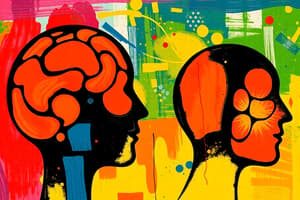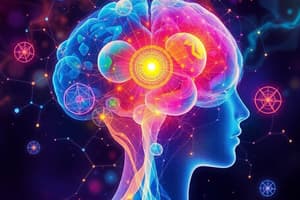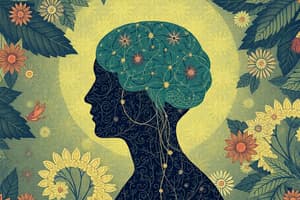Podcast
Questions and Answers
What do many ancient traditions, including Indian philosophical traditions, engage themselves with?
What do many ancient traditions, including Indian philosophical traditions, engage themselves with?
- Exploring underwater ecosystems
- Studying outer space
- Asking questions about human nature (correct)
- Investigating animal behavior
Psychology primarily studies external stimuli and visible behaviors.
Psychology primarily studies external stimuli and visible behaviors.
False (B)
What term is psychology formally defined as?
What term is psychology formally defined as?
science dealing with processes underlying human experience and behavior
Behaviour is a response or reaction we make in different situations, both ____ and ____.
Behaviour is a response or reaction we make in different situations, both ____ and ____.
What are the two parallel streams of psychology mentioned in the text?
What are the two parallel streams of psychology mentioned in the text?
Psychology considers itself a discipline largely focused on biological principles to explain human behavior.
Psychology considers itself a discipline largely focused on biological principles to explain human behavior.
Psychology seeks to understand and explain behavior, mental processes, and experiences in a ___________ and verifiable ma.nner
Psychology seeks to understand and explain behavior, mental processes, and experiences in a ___________ and verifiable ma.nner
What has psychology been influenced by according to the text?
What has psychology been influenced by according to the text?
John Dewey used __________ to argue that human beings seek to function effectively by adapting to their environment.
John Dewey used __________ to argue that human beings seek to function effectively by adapting to their environment.
Who viewed human behavior as a dynamic manifestation of unconscious desires and conflicts?
Who viewed human behavior as a dynamic manifestation of unconscious desires and conflicts?
Who are some humanists in psychology that emphasized the free will of human beings and their natural striving to grow?
Who are some humanists in psychology that emphasized the free will of human beings and their natural striving to grow?
Cognitive psychology focuses on understanding how humans know about the world.
Cognitive psychology focuses on understanding how humans know about the world.
What is psychoneuroimmunology and what does it emphasize?
What is psychoneuroimmunology and what does it emphasize?
What is the main idea behind Dweck's study mentioned in the text?
What is the main idea behind Dweck's study mentioned in the text?
What did the study by Dweck reveal about students' response to failure?
What did the study by Dweck reveal about students' response to failure?
What was the primary focus of Gestalt psychology as a reaction to structuralism?
What was the primary focus of Gestalt psychology as a reaction to structuralism?
Developmental psychology studies the __________ changes that occur at different ages and stages over a life-span, from conception to old age.
Developmental psychology studies the __________ changes that occur at different ages and stages over a life-span, from conception to old age.
Which field of psychology focuses on workplace behavior and improving work conditions?
Which field of psychology focuses on workplace behavior and improving work conditions?
School psychology is primarily focused on promoting physical development in children.
School psychology is primarily focused on promoting physical development in children.
What is the primary focus of Sports Psychology?
What is the primary focus of Sports Psychology?
What type of concerns were part of philosophy until the end of the 19th century, but are now part of contemporary psychology?
What type of concerns were part of philosophy until the end of the 19th century, but are now part of contemporary psychology?
Which field was instrumental in preventing people from engaging in health hazardous behaviors and adhering to doctors' regimens?
Which field was instrumental in preventing people from engaging in health hazardous behaviors and adhering to doctors' regimens?
Doctors have realized that a healthy body requires a healthy ___.
Doctors have realized that a healthy body requires a healthy ___.
Psychology greatly draws from philosophy, particularly in terms of human nature.
Psychology greatly draws from philosophy, particularly in terms of human nature.
Match the disciplines with their involvement with psychology:
Match the disciplines with their involvement with psychology:
What is behaviour? Provide examples of overt and covert behaviour.
What is behaviour? Provide examples of overt and covert behaviour.
How can you distinguish scientific psychology from the popular notions about the discipline of psychology?
How can you distinguish scientific psychology from the popular notions about the discipline of psychology?
Give a brief account of the evolution of psychology.
Give a brief account of the evolution of psychology.
What are the problems for which collaboration of psychologists with other disciplines can be fruitful? Take any two problems to explain.
What are the problems for which collaboration of psychologists with other disciplines can be fruitful? Take any two problems to explain.
Differentiate between (a) a psychologist and a psychiatrist (b) a counsellor and a clinical psychologist.
Differentiate between (a) a psychologist and a psychiatrist (b) a counsellor and a clinical psychologist.
Describe some of the areas of everyday life where understanding of psychology can be put to practice.
Describe some of the areas of everyday life where understanding of psychology can be put to practice.
How can knowledge of the field of environmental psychology be used to promote environment friendly behaviour?
How can knowledge of the field of environmental psychology be used to promote environment friendly behaviour?
In terms of helping solve an important social problem such as crime, which branch of psychology do you think is most suitable.Identify the field and discuss the concerns of the psychologists working in this field.
In terms of helping solve an important social problem such as crime, which branch of psychology do you think is most suitable.Identify the field and discuss the concerns of the psychologists working in this field.
Flashcards are hidden until you start studying
Study Notes
What is Psychology?
- Psychology is the study of mental processes, experiences, and behavior in different contexts.
- It seeks to understand and explain how the mind works and how different mental processes result in different behaviors.
Definition of Psychology
- Psychology is formally defined as a science that studies mental processes, experiences, and behavior in different contexts.
- It uses methods of biological and social sciences to obtain data systematically and make sense of these data to organize them as knowledge.
Mental Processes, Experiences, and Behavior
- Mental processes refer to states of consciousness or awareness, such as thinking, solving problems, knowing, or remembering.
- Experiences are internal to the experiencing person and are subjective in nature.
- Behavior refers to responses or reactions we make or activities we engage in, which can be overt or covert.
Psychology as a Discipline
- Psychology is a young science that studies behavior, mental processes, and experiences in a systematic and verifiable manner.
- It has two parallel streams: one that uses methods of physical and biological sciences, and another that uses methods of social and cultural sciences.
Psychology as a Natural Science
- Psychology was influenced by developments in physics and has grown by following the hypothetico-deductive model.
- Scientists have developed theories of learning, memory, attention, perception, motivation, and emotion, and have made significant progress.
Psychology in Everyday Life
-
Psychology helps us understand ourselves and others better.
-
It contributes to human well-being and improves our understanding of human nature.
-
Examples of psychology in everyday life include understanding why people behave in certain ways, why people go out of their way to help others, and why innocent people suffer.### Psychology as a Social Science
-
Psychology studies human beings in their socio-cultural contexts, focusing on individuals and communities.
-
Humans are influenced by and create their socio-cultural contexts, making psychology a social science discipline.
Understanding Mind and Behaviour
- The mind cannot exist without the brain, but it is a separate entity, as evidenced by cases of brain damage where patients still respond correctly to visual cues.
- Examples include patients who continued to feel their "phantom arm" even after surgery, and a young man who believed his parents were replaced by duplicates after brain injury.
Popular Notions about the Discipline
- Everyday, almost everyone acts like a psychologist, trying to understand why someone behaved in a certain way.
- People develop their own theories of human behavior, but these may not be true if scientifically investigated.
- An example is the study by Dweck (1975) that found praising effort rather than ability helps build confidence and perseverance.
Evolution of Psychology
- Psychology as a modern discipline has a short history, growing out of ancient philosophical concerns.
- Wilhelm Wundt established the first experimental laboratory in Leipzig, Germany in 1879, marking the formal beginning of modern psychology.
- The Gestalt psychology perspective emerged in Germany as a reaction to structuralism, focusing on the organization of perceptual experiences rather than components of the mind.
- Behaviourism emerged as a reaction to structuralism, focusing on observable behavior rather than mind and consciousness.
- Humanistic psychologists like Carl Rogers and Abraham Maslow emphasized the free will of human beings and their natural striving to grow and unfold their inner potential.
Landmarks in the Evolution of Modern Psychology
- 1879: Wilhelm Wundt establishes the first psychology laboratory in Leipzig, Germany.
- 1890: William James publishes Principles of Psychology.
- 1900: Sigmund Freud develops Psychoanalysis.
- 1904: Ivan Pavlov wins the Nobel Prize for his work on the digestive system that led to the development of responses.
- 1954: Humanistic psychologist Abraham Maslow publishes ‘Motivation and Personality’.
- 1973: Konrad Lorenz and Niko Tinbergen win the Nobel Prize for their work on built-in species-specific animal behavior patterns.### Development of Psychology in India
- The Indian philosophical tradition has a rich focus on mental processes and reflections on human consciousness, self, mind-body relations, and various mental functions.
- Unfortunately, the philosophical roots in the Indian tradition have not influenced the development of modern psychology in India.
- The development of psychology in India continues to be dominated by Western psychology, although some attempts have been made to find points of departure from Western psychology.
- The modern era of Indian psychology began in the Department of Philosophy at Calcutta University, where the first syllabus of experimental psychology was introduced and the first psychology laboratory was established in 1915.
- The University of Calcutta started the first Department of Psychology in 1916 and another Department of Applied Psychology in 1938.
- The beginning of modern experimental psychology at Calcutta University was greatly influenced by the Indian psychologist Dr. N.N. Sengupta, who was trained in the USA in the experimental tradition of Wundt.
Branches of Psychology
- Cognitive Psychology: investigates mental processes involved in acquisition, storage, manipulation, and transformation of information received from the environment.
- Biological Psychology: focuses on the relationship between behavior and the physical system, including the brain and the rest of the nervous system, the immune system, and genetics.
- Neuropsychology: emerged as a field of research where psychologists and neuroscientists work together to study the role of neurotransmitters or chemical substances responsible for neural communication in different areas of the brain.
- Developmental Psychology: studies the physical, social, and psychological changes that occur at different ages and stages over a lifespan, from conception to old age.
- Health Psychology: focuses on the role of psychological factors in the development, prevention, and treatment of illness.
- Clinical and Counselling Psychology: deals with the causes, treatment, and prevention of different types of psychological disorders.
- Social Psychology: explores how people are affected by their social environments, how people think about and influence others.
- Cross-cultural and Cultural Psychology: examines the role of culture in understanding behavior, thought, and emotion.
- Environmental Psychology: studies the interaction of physical factors such as temperature, humidity, pollution, and natural disasters on human behavior.
- Industrial/Organisational Psychology: deals with workplace behavior, focusing on both the workers and the organizations that employ them.
Other Emerging Branches of Psychology
- Aviation psychology
- Space psychology
- Military psychology
- Sports psychology
- Educational psychology
- School psychology
- Forensic psychology
- Rural psychology
- Engineering psychology
- Managerial psychology
- Community psychology
- Psychology of women
- Political psychology
Interdisciplinary Approach
- Psychology shares its knowledge with other disciplines such as neurology, physiology, biology, medicine, and computer science.
- Psychology shares its knowledge with anthropology, sociology, social work, political science, and economics in studying human behavior in a socio-cultural context.
- Psychology shares its knowledge with literature, art, and music in studying mental activities involved in creation of literary texts, music, and drama.
Studying That Suits You
Use AI to generate personalized quizzes and flashcards to suit your learning preferences.




